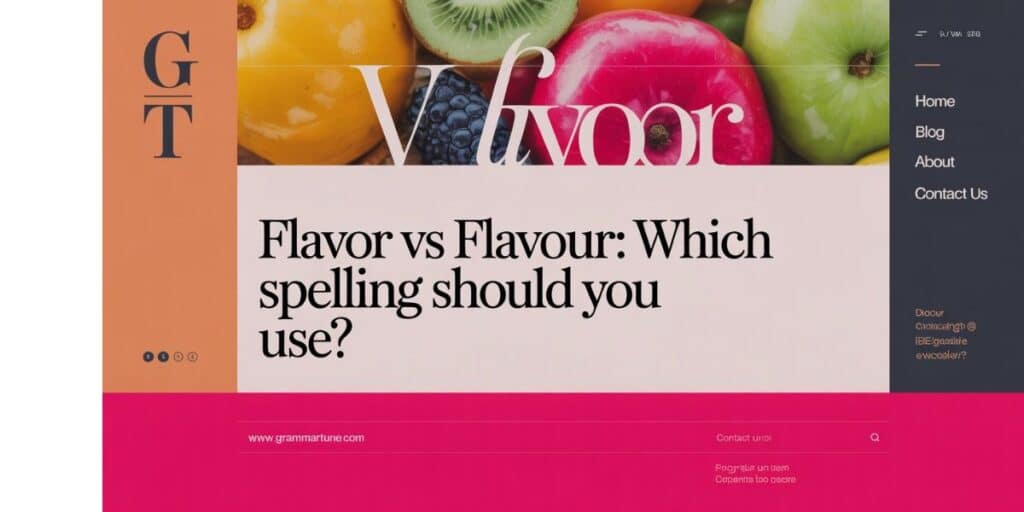Do not wonder the next time as to whether it is spelled flavour or flavor while you are in the midst of a sentence. It is these spelling differences that somewhat characterize the American from British English. Learn about them properly to always be able to spell them right.
Flavor vs Flavour: What’s the Difference?
Have you ever wondered why “flavour” is spelled with a “u” by some people and “flavor” by others? This sounds like a small difference, yet it underscores a larger division unintelligible between American English and British English altogether. Although the terms refer to the very same thing, it is the spelling that gives proof of distinct linguistic histories.
Must read: What is the Past Tense of ‘Seek’? Is it ‘Seek’ or ‘Sought’?
Why the Confusion Exists
Since the early nineteenth century, the spelling divergence has been evolving. Persons like Noah Webster in America, who stood for simplified spellings to bolster an American character, were influential characters in such endeavors.
His campaign bore some results, such as spellings that replaced colour with color and flavour with flavor. British English, of course, kept many of them intact owing to the legacy of older norms, as well as the weight given by Samuel Johnson’s dictionary of 1755.
American vs British English: Key Spelling Differences
The difference between American English and British English goes beyond an argument about “flavor” and “flavour.” For instance, words ending in -our in British English usually get -or in American English:
- colour (UK) vs. color (US)
- honour (UK) vs. honor (US)
- labour (UK) vs. labor (US)
These differences reflect broader trends in spelling conventions between the two variants of English .
Meaning of “Flavor” and “Flavour”
Nevertheless, both “flavor” and “flavour” refer to the organoleptic property that a substance particularly has for foods and drinks. The only difference in the words is regional spelling preference.
Spelling Conventions and Regional Usage
The choice between “flavor” and “flavour” often depends on the region:
- United States: “Flavor” is predominantly used.
- United Kingdom, Australia, New Zealand: “Flavour” is the standard.
- Canada: Usage is mixed, with both spellings appearing depending on context .
Understanding these regional preferences is crucial, especially for writers and businesses aiming to connect with specific audiences.
Impact on Communication
The subtle distinctions between the two different spellings “flavor” and “flavour” affect communication considerably because inconsistent spelling can confuse readers or present a very unprofessional quality about one’s work.
Suppose a food product is labeled with inconsistent spellings-the consumers may question the origin or authenticity of the product.
You will like: What’s the Past Tense of Troubleshoot?
Examples in Real-World Context
The Examples Using “Flavor”:
- The ice cream had a rich vanilla flavor.
- She prefers the flavor of freshly ground coffee.
Examples Using “Flavour”:
- The chef emphasized the flavour of the herbs.
- This wine has a robust flavour profile.
Synonyms and Similar Terms
The synonyms common to both terms are “taste”, “savor”, and “essence”. These may be substituted for one another depending on the context, while an idiosyncratic connotation may be appended to certain terms.
Etymology: The Origins of the Word
Origins of “Flavor”:
Emanating from the early 19th century, the American spelling flavor took greater form as a byproduct of Noah Webster’s simplification of spelling in English. Thus, his dictionary has had a historic significant influence on standardizing American English spellings .
Origins of “Flavour”:
The British spelling “flavor” maintains the old-fashioned -our ending like other British English terms, such as “colour” and “honour”. This was made official through Samuel Johnson’s dictionary and continues to be used in British English today.
You will like: Understanding the Past Tense of ‘Putting’: Is it ‘Put’ or ‘Putted’?
Conclusion
Flavor and flavour are just a matter of geography – if you’re American, flavor is correct; if you’re British or from the Commonwealth, you would go for flavour. They are understood universally, but selecting them correctly will indicate that you are very keen on details and attentive to your audience’s norms.
Whether it is for branding or writing an article, consistency is important. So, when in doubt, check your audience and choose wisely: Flavor versus Flavour—your spelling, your message.
FAQ,S
Is “flavor” or “flavour” correct?
Both are correct—“flavor” is American, “flavour” is British.
Do they mean the same thing?
Yes, they both refer to taste or sensation in food and drink.
Can I use them interchangeably?
Only if your audience doesn’t mind. Otherwise, stick to one style.
Which countries use “flavour”?
UK, Canada, Australia, and New Zealand prefer “flavour.”
Why do Americans drop the ‘u’?
To simplify spelling, based on Noah Webster’s reforms in the 1800s.

Joulia, a seasoned wordsmith and grammar enthusiast, brings over a decade of blogging expertise to Grammar Tune. With a keen eye for linguistic precision and a passion for making complex grammar concepts accessible, he has helped thousands of readers enhance their writing skills. His engaging teaching style and practical approach to language learning have made him a trusted voice in the online grammar community.







